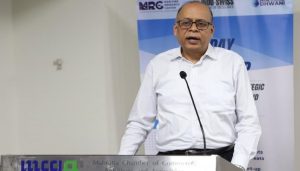‘Drop in the Fiscal Deficit a Good Sign’
Pune, February 5, 2017: The decrease in the fiscal deficit and estimated increase in the income tax receipts are the positives of the Union Budget was the unanimous opinion of the Panellists at the discussion on Union Budget 2017-18. The discussion was organised by Pune International Centre (PIC) at the Gokhale Institute of Politics and Economics.
The panel included Dr. Achintan Bhattacharya, Director, National Institute of Bank Management (NIBM), Dr. Pradeep Apte, Professor, Gokhale Institute of Politics and Economics (GIPE), Dr. Rathin Roy, Director, National Institute of Public Finance and Policy (NIPFP), Delhi, Dr. Shubhashish Gangopadhyay, Director, India Development Foundation (IDF), Delhi. The discussion was chaired by noted economist Dr Ajit Ranade.
In his opening remarks, Ranade highlighted important set of statistics from this year’s union budget. That included the decrease of the fiscal deficit ratio from 3.5% to 3.2% of the GDP. This decrease saw a surge in the National Budget by 6% and next year the national income is expected to rise by 12%.
“Along with the decrease in the fiscal deficit, the income tax is expected to grow by 25% this year,” said Ranade. He further elaborated that the rise in the income tax is due to the large deposits in 1 Crore bank accounts across India after demonetization. “The large number of deposits has caught the attention of the Income Tax department and many of the depositors have been served notices, this act will definitely boost the income tax rise,” he said.
Highlighting positives of the budget Ranade added that the affordable housing has been given an infrastructure status will help build more affordable homes. Others also included 3,500 km of railway lines to be commissioned this year up from 2,800 km last year, allocation Rs. 64,000 Crore for highways and Rs. 19,000 Crore for Pradhan Mantri Gram Sadak Yojana.
While calling it a budget that is prudent in practice and extravagant in rhetoric, Dr Roy laid out various aspects of the budget. He said, “This budget has estimated a rise in income tax receipts can lead to the return of tax terrorism in our country. We have to be aware about it,” said Dr Roy. He further added that though the decrease in fiscal deficit is a good sign, the rise in the budget allocation for Mahatma Gandhi National Rural Employment Mission (MGNREM) reflects a failure of the system as it is benefiting only a few people. The MGNREM was allocated Rs 48,000 Crore of fund in this budget that is considered as the highest allocation for the rural employment policy till date.
Dr. Bhattacharya called this a fantastic budget from an accountant’s perspective. He said, “The budget looks balanced yet it lacks the continuity from the earlier budgets and a vision to grow. The banking sector has definitely benefited from the budget.”
While focussing on the allocations for Rural Development and Agricultural Credit limit, Dr. Apte said, “The target of Rs 10 lakh Crore for agricultural credit is confusing as it is not clear to whom this target is given to. Also, there are many gaps and lack of infrastructure when it comes to the allocation of funds for rural development.” He further added that this is a ‘run on the mill’ budget; it is promoting ideas but not maximum governance. Dr. Apte also expressed concerns over the possible return of tax terrorism.
Dr.Gangopadhyay emphasized on the social spending allocated in the budget. He said that unlike developed countries, the social spending in India has not seen any impact on the GDP. “The rise in the MGNREM funds clearly suggests that there is no significant economic or social growth of our country. The poor people are remaining poor as they are not getting skilled and finding employment elsewhere,” he said.
Veteran Economist Dr Vijay Kelkar felicitated the panellists. Prashant Girbane, Honorary director, PIC concluded the session with vote of thanks.







